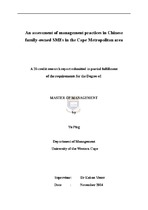An assessment of management practices in Chinese family-owned SMEs in the Cape Metropolitan area
Abstract
China is a country built on traditions and one of its most respected traditions is a preference for the family unit. The closeness of the family unit is carried over into the economic life of the country. Family members not only live together, but also work together in the fields or in enterprises. The advantage of this is that families have a guaranteed labour force that is not only loyal and can also be trusted. The disadvantage however is that positioning within the business is not always based on merit and competence, or trustworthiness which can ultimately impede growth. This research was an examination of Chinese family-owned businesses that focused on their management practices. The purpose of the study was to explore the management characteristics of Chinese family-owned businesses by means of interview data collected from five Chinese businesses in the Cape Metropolitan area. The emphasis of the project concentrated on the establishment, expansion and growth, ownership and leadership, management structure, the impact of cultural factors and the strategy for the future as well as challenges in terms of competitors and environments.

